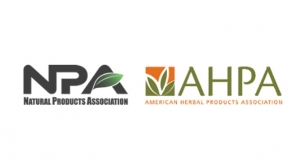01.28.19
The Natural Products Association (NPA) has urged the Food and Drug Administration (FDA) to adopt a policy of enforcement discretion on standards of identity for products that use dairy names to describe plant-based products such as “soy milk” and “almond milk.”
“Plant-based products, as long as they are properly qualified, like almond milk, soy milk, and nut cheeses, are understood by consumers, and there is no confusion as to the nutrient differences,” said Daniel Fabricant, PhD, president and CEO of NPA. “Use of these terms to describe plant-based products has been documented in recipes and manuscripts dating back to Roman times and medieval Europe. USDA used the term ‘soy-bean milk’ in educational materials to document its compositional analysis and develop a nutritional comparison prior to the turn of the last century.
“Does this standard of identity issue actually rise to the level of a public health threat that FDA must address it now?” he continued. “I would think the agency has more pressing matters at hand. If FDA has data to suggest it is an issue, then we are happy to discuss ways to fix it, but that evidence has not been brought to light.”
He went on to argue for federal pre-emption on labeling, “which is necessary on standards of identity and other labeling issues to prevent trial lawyers from picking a different set of regulations to suit their case in a given week. We do not need a patchwork of various regulations coming from the states. FDA should not be in the business of finding ways for the Plaintiff’s bar to get paid.”
Under current FDA standards, “milk from any other farm animal would not qualify as ‘milk’ including camel’s, sheep’s and goat’s milk, according to FDA’s formal definition codified in the federal regulations,” NPA noted.
“If FDA plans to take on plant-based products using ‘dairy’ terms, are they going after goat milk products next because they are not the product of ‘one or more cows’ as per the definition in the codified regulations? Does goat milk need a disclaimer that it does not contain actual milk? That would be confusing to consumers.”
NPA also urged FDA to consider commercial free speech in its decision. “Consumers deserve access to accurate and meaningful information about the products they use each and every day, but FDA taking aim at products with ‘dairy’ terms as part of the tradename is surprising. As the FDA considers making changes to the ways many popular products are labeled and branded, we urge the agency to also consider the impact they could have on commercial free speech,” said Dr. Fabricant.
The government must prove there is a substantial risk to consumers, he added. “We are optimistic the FDA’s process will lead to an outcome that both protects consumers and ensures the producers of natural products and plant-based foods are not burdened with unnecessary regulations. We look forward to working with the FDA on this issue and submitting formal comments.”
NPA’s comments can be viewed here.
“Plant-based products, as long as they are properly qualified, like almond milk, soy milk, and nut cheeses, are understood by consumers, and there is no confusion as to the nutrient differences,” said Daniel Fabricant, PhD, president and CEO of NPA. “Use of these terms to describe plant-based products has been documented in recipes and manuscripts dating back to Roman times and medieval Europe. USDA used the term ‘soy-bean milk’ in educational materials to document its compositional analysis and develop a nutritional comparison prior to the turn of the last century.
“Does this standard of identity issue actually rise to the level of a public health threat that FDA must address it now?” he continued. “I would think the agency has more pressing matters at hand. If FDA has data to suggest it is an issue, then we are happy to discuss ways to fix it, but that evidence has not been brought to light.”
He went on to argue for federal pre-emption on labeling, “which is necessary on standards of identity and other labeling issues to prevent trial lawyers from picking a different set of regulations to suit their case in a given week. We do not need a patchwork of various regulations coming from the states. FDA should not be in the business of finding ways for the Plaintiff’s bar to get paid.”
Under current FDA standards, “milk from any other farm animal would not qualify as ‘milk’ including camel’s, sheep’s and goat’s milk, according to FDA’s formal definition codified in the federal regulations,” NPA noted.
“If FDA plans to take on plant-based products using ‘dairy’ terms, are they going after goat milk products next because they are not the product of ‘one or more cows’ as per the definition in the codified regulations? Does goat milk need a disclaimer that it does not contain actual milk? That would be confusing to consumers.”
NPA also urged FDA to consider commercial free speech in its decision. “Consumers deserve access to accurate and meaningful information about the products they use each and every day, but FDA taking aim at products with ‘dairy’ terms as part of the tradename is surprising. As the FDA considers making changes to the ways many popular products are labeled and branded, we urge the agency to also consider the impact they could have on commercial free speech,” said Dr. Fabricant.
The government must prove there is a substantial risk to consumers, he added. “We are optimistic the FDA’s process will lead to an outcome that both protects consumers and ensures the producers of natural products and plant-based foods are not burdened with unnecessary regulations. We look forward to working with the FDA on this issue and submitting formal comments.”
NPA’s comments can be viewed here.


















